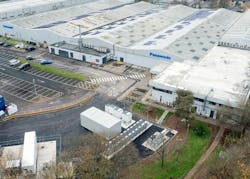Panasonic Manufacturing UK Integrating Hydrogen, Solar and Battery Storage to Power Microwave Oven Plant in Wales
Appliance producer Panasonic Corp. is installing hydrogen fuel cell, solar and batteries to power its microwave oven manufacturing plant in Cardiff, Wales.
The demonstration project will integrate renewable energy generated by the system including pure hydrogen fuel cell generators, photovoltaic generators, and storage batteries. Panasonic Manufacturing UK (PMUK) will try to enhance resilience by generating and storing only the amount of electricity required on-site.
Additionally, it will establish an energy management system (EMS) to track changes in the factory's electricity demand and weather changes in the UK. The EMS will begin operation by the end of March 2025 and provide a stable supply of renewable energy to the microwave oven assembly factory.
PMUK has installed 21 units of 5-kW hydrogen fuel cell generators. PMUK aims to operate the system to supply the necessary electricity from 100 percent renewable energy with the help of 372 kW in photovoltaic generators and 1 MWh in storage batteries.
The electricity used in the microwave oven assembly factory will be decarbonized due to the use of green hydrogen produced in the UK. To be classified as “green” H2, the hydrogen is created by spitting the molecules from water using electrolyzers powered by carbon-free energy such as hydro, solar, wind or nuclear.
In 2023, Panasonic Manufacturing installed 760 kW of rooftop solar. Nearly half of those photovoltaic panels will generate the energy toward the microwave oven assembly factory.
At the demonstration facility, heat generated during the electricity production by the pure hydrogen fuel cell generators will be used to provide heating and hot water in the microwave oven assembly factory to achieve an energy efficiency of 95 percent for the pure hydrogen fuel cell generators with the cogeneration effect.
The heat generated during power generation will be used to preheat water for the newly installed water circulation air conditioning system to further reduce power consumption during hot water heating operation through integrated heat utilization.
The process will help Panasonic accumulate know-how for enhancing the EMS, strengthen its supply and demand adjustment technology to minimize losses in the generation, storage, and transmission of renewable energy, and ensure a stable energy supply. The demonstration uses green hydrogen for in-house power generation and integrates and controls three types of energy sources to run the factory on 100 percent renewable energy in environmentally advanced European countries.
The Panasonic Group has established Panasonic GREEN IMPACT, its long-term environmental vision. Under the vision, the group is engaged in business activities with the goal of reducing CO2 emissions from its operations to net zero by 2030 and creating an impact that reduces CO2 emissions by more than 300 million tons, approximately 1 percent of the current total global CO2 emissions of about 33 billion tons by 2050.
